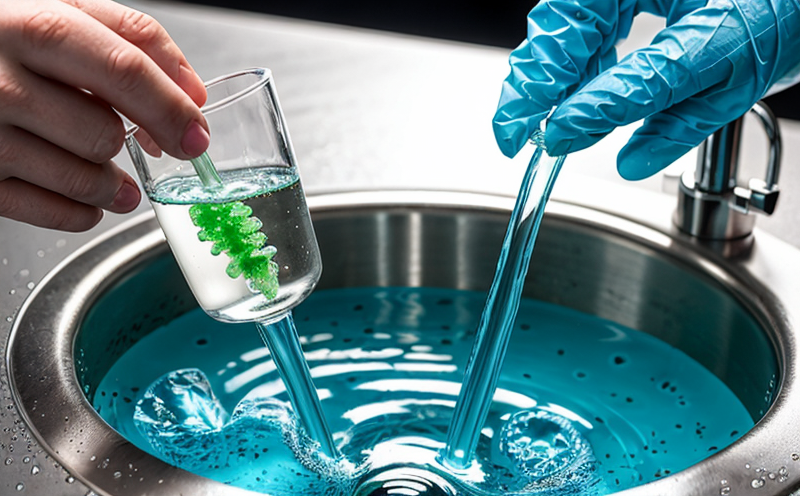ISO 7937 Clostridium Perfringens Enumeration Test in Water
The ISO 7937 test method is a critical tool for quality managers and compliance officers to ensure the safety and microbial quality of water supplies. Clostridium perfringens are Gram-positive, spore-forming bacteria commonly found in soil, dust, and raw meat. Their presence can indicate contamination from fecal matter and serve as an indicator organism for the possible presence of other harmful pathogens.
The significance of this test lies in its role as a hygiene indicator. As such, it is widely used to monitor the cleanliness of water systems before they are distributed to consumers. The method quantifies the number of viable Clostridium perfringens cells present in a given volume of water, which helps in assessing the overall quality and safety of the water.
The test is particularly important for industries such as pharmaceuticals, food processing, and municipal water treatment plants. In these sectors, maintaining high standards of hygiene is paramount to prevent contamination that could lead to product spoilage or health issues. The results from this test can inform corrective actions needed to maintain the desired quality levels.
The ISO 7937 method involves a series of steps designed to accurately enumerate Clostridium perfringens cells in water samples. These include sample preparation, inoculation into appropriate media, incubation conditions, and final enumeration of colonies that appear after growth. The test is sensitive enough to detect even low levels of contamination, making it an essential tool for quality assurance.
Accurate enumeration of Clostridium perfringens is crucial not only for hygiene but also for regulatory compliance. Regulatory bodies often require water suppliers and processors to adhere to specific standards such as those outlined in ISO 7937. Non-compliance can lead to legal penalties, reputational damage, and potential health risks.
Quality managers and R&D engineers rely on the results of this test to make informed decisions about process improvements and quality control measures. By identifying areas where contamination may occur, they can implement strategies to minimize risk and ensure that the final product meets all regulatory requirements.
Applied Standards
The ISO 7937 test method is internationally recognized for its accuracy and reliability. It complies with international standards, ensuring consistency in methodology across different regions. This standardization is crucial for industries that operate globally or require interoperability between laboratories.
ISO 7937 specifies the procedure for the enumeration of Clostridium perfringens in water by means of a modified Baird-Parker agar plate method. The standard provides detailed instructions on sample preparation, inoculation techniques, incubation conditions, and colony count methods to ensure that results are reproducible and comparable.
The application of this international standard ensures that the test results can be trusted and relied upon by regulatory bodies, quality assurance teams, and other stakeholders. Compliance with ISO 7937 not only enhances credibility but also supports continuous improvement in water quality management practices.
Scope and Methodology
| Step | Description |
|---|---|
| Sample Collection | Water samples should be collected from various points in the distribution system to ensure a representative sample. Samples must be handled under strict aseptic conditions to avoid contamination. |
| Inoculation and Incubation | The water samples are inoculated into modified Baird-Parker agar plates, which contain chromogenic substrate for Clostridium perfringens. These plates are incubated at 36 ± 1°C for a specified duration. |
| Colonies Count | The number of colonies that appear on the agar plates is counted after incubation. The count represents the viable Clostridium perfringens cells present in the water sample. |
Eurolab Advantages
EuroLab is a trusted provider of microbiological testing services, offering expertise and reliability to support your quality assurance needs. Our dedicated team of scientists and analysts ensures that all tests are conducted in strict adherence to ISO standards.
We offer a comprehensive range of water testing services, including the enumeration of Clostridium perfringens as specified by ISO 7937. Our state-of-the-art laboratory facilities are equipped with advanced instrumentation and reagents, ensuring precise and accurate results.
Our experienced staff provides detailed reports that include not only the quantitative data but also insights into potential sources of contamination and recommendations for improvement. This level of service ensures you have all the information needed to maintain or enhance the quality of your water supply.
EuroLab's commitment to excellence is reflected in our certifications, which include ISO/IEC 17025 accreditation. This certification guarantees that our testing meets the highest standards of accuracy and reliability. Our services are trusted by leading companies across various sectors, including pharmaceuticals, food processing, and municipal water systems.
By choosing EuroLab for your Clostridium perfringens enumeration tests, you can be confident in the quality and integrity of our results. We offer prompt turnaround times, ensuring that you receive timely reports to support your decision-making processes.





